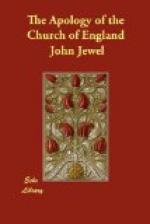In times past, when Nazianzen saw in his days how men in such assemblies were so blind and wilful that they were carried with affections, and laboured more to get the victory than the truth, he pronounced openly that he never had seen any good end of any council. What would he say now, if he were alive at this day, and understood the heaving and shoving of these men? For at that time, though the matter were laboured on all sides, yet the controversies were well heard, and open error was put clean away by the general voice of all parts. But these men will neither have the case to be freely disputed, nor yet, how many errors soever there be, suffer they any to be changed. For it is a common custom of theirs often and shamelessly to boast that “their Church cannot err; that in it there is no fault; and that they must give place to us in nothing.” Or if there be any fault, yet must it be tried by bishops and abbots only, because they be the directors and rulers of matters; and they be the Church of God. Aristotle saith that a “city cannot consist of bastards;” but whether the Church of God may consist of these men, let their own selves consider. For doubtless neither be the abbots legitimate abbots, nor the bishops natural right bishops. But grant they be the Church: let them be heard speak in councils; let them alone have authority to give assent: yet in old time, when the Church of God (if ye will compare it with their Church) was very well governed, both elders and deacons, as saith Cyprian, and certain also of the common people, were called thereunto, and made acquainted with ecclesiastical matters.
But I put case, these abbots [and bishops] have no knowledge: what if they understand nothing what religion is, nor how we ought to think of God? I put case, the pronouncing and ministering of the law be decayed in priests, and good counsel fail in the elders, and, as the prophet Micah saith, “The night be unto them instead of a vision, and darkness instead of prophesying:” or, as Esaias saith, “What if all the watchmen of the city are become blind?” “What if the salt have lost his proper strength and savoriness,” and, as Christ saith, “be good for no use, scant worth the casting on the dunghill?”
Well, yet then they will bring all matters before the Pope, who cannot err. To this I say, first, it is a madness to think that the Holy Ghost taketh His flight from a general council to run to Rome, to the end if He doubt or stick in any matter, and cannot expound it of Himself, He may take counsel of some other spirit, I wot not what, that is better learned than Himself. For if this be true, what needed so many bishops, with so great charges and so far journeys, have assembled their convocation at this present at Trident? It had been more wisdom and better, at least it had been a much nearer way and handsomer, to have brought all things rather before the Pope, and to have come straight forth, and have




